
Internship
■Shanghai, 2013.Aug.4 ~ 2013.Aug.11
■Participants
10 Students, 8 Tutors from HIGO Program
6 Students, 2 Tutors from Graduate School of Social and Cultural Sciences, Kumamoto University
■Purpose
China, the center of focus increasingly with a rapid economic growth, is strengthening tie with Japan, so the visit to Shanghai, hub of dynamic Chinese economy, its healthcare institutions, universities, administrative offices, firms, will surely enable us to deepen understanding of Chinese present healthcare, Chinese society, and nurture ability to find Asian regional needs and issues by themselves, and foster international-mindedness.
or_logo.gifSchedule
■Contents
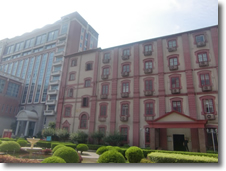
Schedule
Aug4th, Sun: Kumamoto University - Fukuoka Airport - Shanghai Pudong Airport
Aug.5th.Mon: Visit School of Medicine, Shanghai Jiao Tong University, Research Interaction among Graduate Students
Join 10th Anniversary of Longhua subdistrict Health Promotion Volunteer Leadership Development
Program
Aug.6th.Tues: Visit Pudong New Area Government / Pengpu Xincun Community Senior Care Facility
Aug.7th.Wed: Shanghai Environment Research Center / Opinion Exchanges with graduate students from School of International and Public Affairs, Shanghai Jiao Tong University / Meeting with young Chinese and Japanese business persons at Kumamoto-Shanghai Office
Aug.8th.Thur: Visit Shanghai University of Traditional Chinese Medicine, Research Interaction with graduate students / Visit Shanghai No.6 People's Hospital
Aug.9th.Fri: Visit World Financial Center, Shanghai History Museum, Visit Punan Hospital and exchange with its staff
Aug.10th.Sat: Suzhou New District, Aoyama Suzhou Co., Ltd. Factory Tour, Exchange with KU alumni / Visit Lingering Garden, Tiger Hill
Aug.11th.Sun: Back to Japan
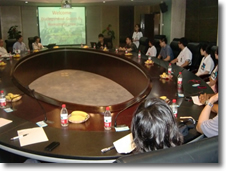
Activity Highlight
Visit School of Medicine, Shanghai Jiao Tong University and Shanghai No.6 People's Hospital
Shanghai Jiao Tong University, renowned as Jiang Zemin's alma mater, is a nationally distinguished university, with its remarkable performance mainly in science and technology. Our students visited the School of Medicine, and communicated with graduate students there on research. They have to go to medical school for 5 years followed by at least 1 year clinical-training, before taking national medical licensing exam. The university has 300 undergraduates, whereas 900 graduates are in Masters and higher course. It trains the brightest students in undergraduate, let them compete in graduate with others selected from home and abroad, in the globally competitive atmosphere of basic research and clinician education. It was exceptionally stimulating for HIGO students to see young doctors and students, leaders of Chinese medicine, their ambition and rivalry, at No.6 People's Hospital, one of the medical centers affiliated to the university, the highly (3rd) graded hospital (ref.1) that provides cutting-edge medicine,.
Ref.1: Chinese hospitals are categorized into some grades, and the 3rd is the highest of all.
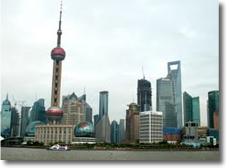
Visit Pudong
Pudong is a district nestled between Huangpu River and Yangtze River mouth, developing rapidly, with lots of skyscrapers that symbolizes Shanghai's economic power. It's hard to imagine it once was a field of wilderness and crops. At Standing Committee of Shanghai Municipal People's Congress, with the aid of administrative officers, the students studied and discussed development strategies and enterprise-invitations. Although in Communist-led autocratic China, the area, regarded as the high-tech development zone, is given much bigger sovereignty than the other government-ruled municipalities. It was a great opportunity to know development strategies that respond to local trends and needs, and the fact that decentralizations, power transfer are going on also in China.
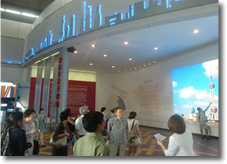
Visit Shanghai University of Traditional Chinese Medicine
Affiliated to the university is the world-largest Chinese medicine museum, which shows numerous medicine rarely seen in Japan. After the observation, we did research exchange with the researchers and graduate students of the university. We were informed that after WHO adopted Chinese Medicine as a global standard, its significance is increasingly recognized in the world. We discussed its effect on diseases that are incurable by western medicine treatment. Chinese medicine could possess the potential that would not be confined to the same realm of evidence applied in Western medicine.
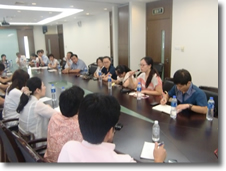
Afterword
Students witnessed the medical and research forefront, which was indeed a precious experience for them. The most thrilling thing was to see the Shanghai students, their strong determination and desire to learn. They're working hard in such competitive atmosphere and passionately spoke of their dream for the future and the nation's. As more projects are being planned for the Leading Program, including network-building like this, this achievement will be of a great help in the future.
We sincerely appreciate the kind and generous cooperation of Prof. Ye Ling ling from Graduate School of Social and Cultural Sciences, Kumamoto University, for coordinating the whole program, as well as Kumamoto-Shanghai Office, Shanghai Jiao Tong University, Fudan University, Shanghai University of Chinese Traditional Medicine, Shanghai healthcare institutions, administrative offices, firms, all those concerned, and alumni of Kumamoto University, for their warm welcome and benevolent support.
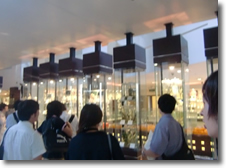
■Students' Voice
I believe Japan still maintains the high status of medicine in the world, but Chinese people's ambition is growing as economy is increasingly heating up, and the research environment has been upgraded to the level of Japan and the U.S. As the competition will be accelerated in the future, I am convinced Japan cannot stay away from it.
Before departure, the media report on anti-Japan demonstration in China had concerned me a lot, but in reality, lots of Shanghaies had interests in Japan. The gap between my image and the actuality about China was so huge, which reminded me of the importance of in-situ observation, sensing, having critical eyes on the given information (media report).
Despite the large population in China, there has been an improvement in the health service and care for the elderly over the years. Also, with scientific improvements, traditional Chinese medicines may become one of the major markets for China in the next couple of years.



